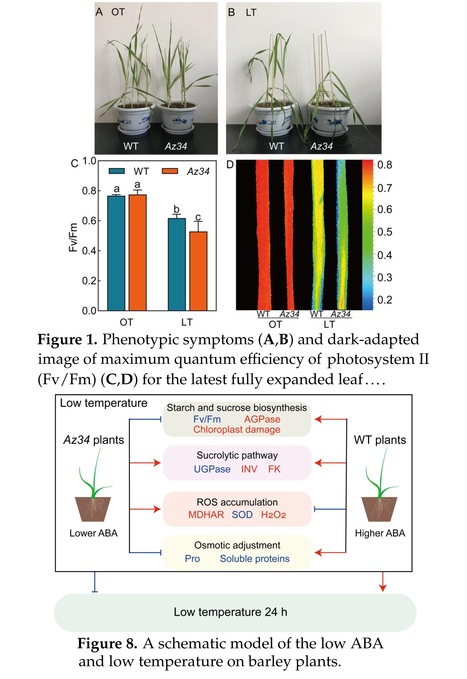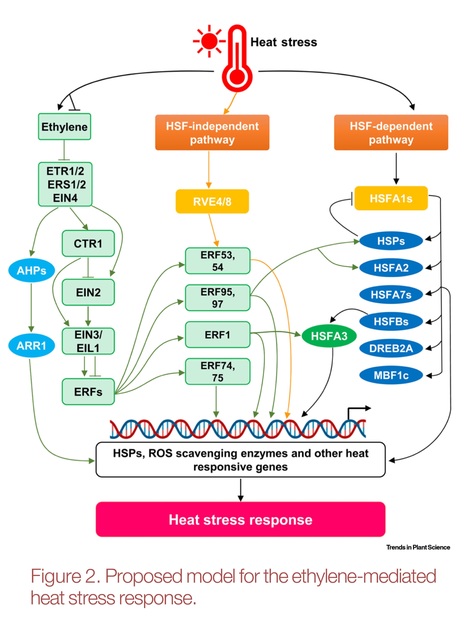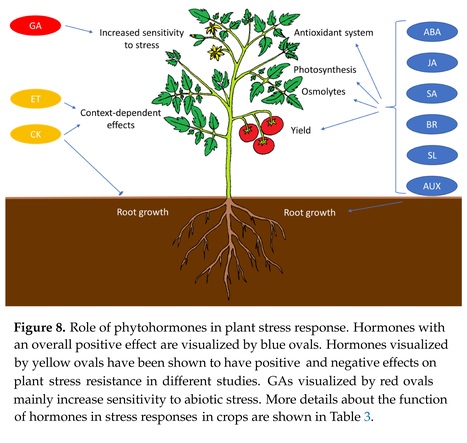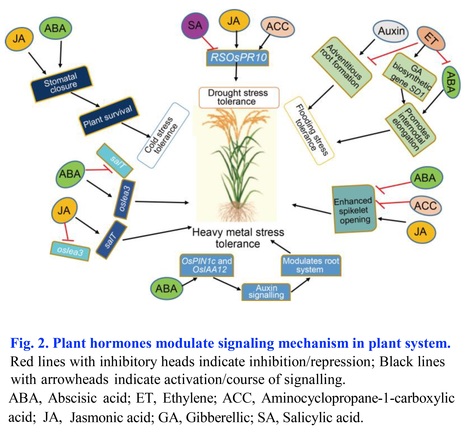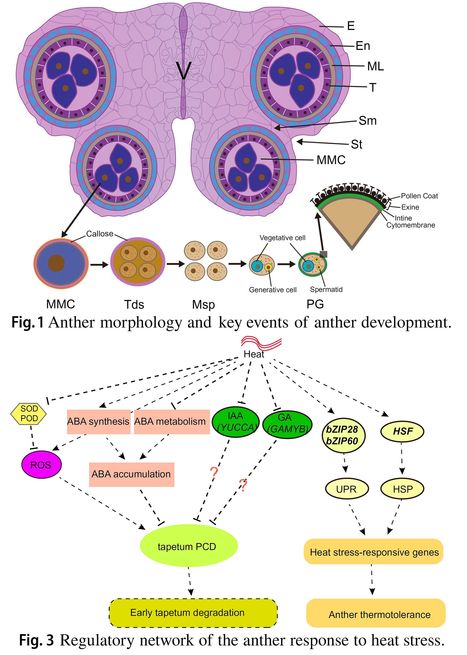 Your new post is loading...
 Your new post is loading...
Authors: Jana Jarošová, Sylva Prerostova, Martin Černý, Petre Dobrev, Alena Gaudinova, Vojtech Knirsch, Eva Kobzová, Karel Müller, Roman Fiala, Kinga Benzcúr, Gabriella Szalai, Jan Novák, Břetislav Brzobohatý, Ondrej Novak and Radomira Vankova.
Environmental and Experimental Botany (2024)
Highlights: • Targeted stresses affected proteins predominantly in the non-exposed organs • Abscisic acid in roots after all cold treatments regulated hydraulic conductivity • Jasmonates in stressed leaves might diminish stress effects on photosynthesis • Salicylic acid probably enhanced sugar unloading from phloem in roots under stress • Pre-acclimation enhanced stress tolerance, and speeded up recovery
Abstract: "Rice is a plant species sensitive to cold stress, which renders seriously its cultivation. Responses to cold stress (5°C, 24 hours) in whole plants, or targeted to rice leaves or roots were followed at the hormonome, transcriptome, proteome, and sugar levels, to find organ-specific responses and processes affected by cold acclimation. Targeted stresses caused proteomic changes mainly in the unexposed organs. An increase in abscisic acid (ABA) was accompanied by a decrease in jasmonic acid (JA) (in roots and non-stressed leaves) and vice versa (JA increased in stressed leaves). Both hormones promote the cold tolerance of plants. In this way, JA could indirectly reduce negative effects of cold on photosynthesis in leaves, while ABA dominates in roots (stimulation of protective substances, especially dehydrins, control of water regime). The decrease in cytokinins trans-zeatin and dihydrozeatin in crowns correlated with stress-induced growth suppression. Leaf-targeted cold stress impaired photosynthesis and decreased sugar levels, diminishing their transport, which correlated with an increase in salicylic acid, which is a signal for sugar unloading from phloem into roots. Root-targeted stress suppressed cytokinin biosynthesis and upward transport, and promoted sugar accumulation in leaves. Acclimation per se activated the transcriptome and proteome response to cold –ABA, JA and ethylene were upregulated, moderately suppressing plant growth. Pre-acclimated plants showed less profound hormonal changes than directly stressed plants, positively affecting levels of growth-related phytohormones in the unexposed organs (cytokinins in roots of leaf-stressed plants; auxins in leaves of root-stressed plants)."
Authors: Junhong Guo, Gerrit T. S. Beemster, Fulai Liu, Zongming Wang and Xiangnan Li.
International Journal of Molecular Sciences (2023
Abstract: "Abscisic acid (ABA) plays a vital role in the induction of low temperature tolerance in plants. To understand the molecular basis of this phenomenon, we performed a proteomic analysis on an ABA-deficit mutant barley (Az34) and its wild type (cv Steptoe) under control conditions (25/18 °C) and after exposure to 0 °C for 24 h. Most of the differentially abundant proteins were involved in the processes of photosynthesis and metabolisms of starch, sucrose, carbon, and glutathione. The chloroplasts in Az34 leaves were more severely damaged, and the decrease in Fv/Fm was larger in Az34 plants compared with WT under low temperature. Under low temperature, Az34 plants possessed significantly higher activities of ADP-glucose pyrophosphorylase, fructokinase, monodehydroascorbate reductase, and three invertases, but lower UDP-glucose pyrophosphorylase activity than WT. In addition, concentrations of proline and soluble protein were lower, while concentration of H2O2 was higher in Az34 plants compared to WT under low temperature. Collectively, the results indicated that ABA deficiency induced modifications in starch and sucrose biosynthesis and sucrolytic pathway and overaccumulation of reactive oxygen species were the main reason for depressed low temperature tolerance in barley, which provide novel insights to the response of barley to low temperature under future climate change."
Authors: Junping He, Lu Yao, Lorenzo Pecoraro, Changxiao Liu, Juan Wang, Luqi Huang and Wenyuan Gao.
Critical Reviews in Biotechnology (2023)
Abstract: "Plants make different defense mechanisms in response to different environmental stresses. One common way is to produce secondary metabolites. Temperature is the main environmental factor that regulates plant secondary metabolites, especially flavonoids and terpenoids. Stress caused by temperature decreasing to 4–10 °C is conducive to the accumulation of flavonoids and terpenoids. However, the accumulation mechanism under cold stress still lacks a systematic explanation. In this review, we summarize three aspects of cold stress promoting the accumulation of flavonoids and terpenoids in plants, that is, by affecting (1) the content of endogenous plant hormones, especially jasmonic acid and abscisic acid; (2) the expression level and activity of important transcription factors, such as bHLH and MYB families. This aspect also includes post-translational modification of transcription factors caused by cold stress; (3) key enzyme genes expression and activity in the biosynthesis pathway, in addition, the rate-limiting enzyme and glycosyltransferases genes are responsive to cold stress. The systematic understanding of cold stress regulates flavonoids, and terpenoids will contribute to the future research of genetic engineering breeding, metabolism regulation, glycosyltransferases mining, and plant synthetic biology."
Authors: Jianyan Huang, Xiaobo Zhao, Marco Bürger, Joanne Chory and Xinchao Wang.
Trends in Plant Science (2023)
Highlights: As a major environmental factor impacting the seasonal growth and geographical distribution of plants, temperature change significantly affects crop quality and productivity. Ethylene is a gaseous hormone with an important role in plant growth, development, and multiple stress responses, including heat and cold. Temperature stress affects ethylene biosynthesis and signaling pathways, with APETALA2/ETHYLENE RESPONSIVE FACTOR (AP2/ERF) transcription factors being the main node of ethylene-mediated temperature stress response. Crosstalk among different phytohormones also alters and regulates the expression of temperature stress-responsive genes.
Abstract: "Temperature influences the seasonal growth and geographical distribution of plants. Heat or cold stress occur when temperatures exceed or fall below the physiological optimum ranges, resulting in detrimental and irreversible damage to plant growth, development, and yield. Ethylene is a gaseous phytohormone with an important role in plant development and multiple stress responses. Recent studies have shown that, in many plant species, both heat and cold stress affect ethylene biosynthesis and signaling pathways. In this review, we summarize recent advances in understanding the role of ethylene in plant temperature stress responses and its crosstalk with other phytohormones. We also discuss potential strategies and knowledge gaps that need to be adopted and filled to develop temperature stress-tolerant crops by optimizing ethylene response."
Authors: Ali Raza, Sidra Charagh, Shiva Najafi-Kakavand, Saghir Abbas, Yasira Shoaib, Sultana Anwar, Sara Sharifi, Guangyuan Lu and Kadambot H.M. Siddique.
Plant Stress (2023)
Highlights: • Cold stress (CS) significantly impacts plant growth and development. • Future food security could be achieved by developing cold-smart plants. • Phytohormones are vital for managing diverse events associated with plant growth and development under CS. • Phytohormones help regulate the CS-responsive regulatory cascade (i.e., ICE-CBF-COR), boosting CS tolerance. • Omics approaches help identify CS-induced phytohormone-encoding novel genes, metabolites, and metabolic pathways. • Genetic engineering of phytohormones biosynthesis genes could help develop cold-smart crops.
Abstract: "Global climate variations induce extreme temperatures and significantly decrease crop production, leading to food insecurity worldwide. Temperature extremes (mainly cold stress (CS): chilling 0–15°C and freezing <0°C temperatures) limit plant growth and development and severely affect plant physiology and biochemical and molecular processes. Subsequently, plants execute numerous endogenous mechanisms, including phytohormone biosynthesis (i.e., abscisic acid, cytokinins, jasmonic acid, salicylic acid, gibberellic acid, brassinosteroids, indole-3-acetic acid, ethylene, and strigolactones) to tolerate stressful environments. Phytohormones are vital for managing diverse events associated with plant growth and development under CS as important endogenous signaling substances that dynamically arbitrate many physiological, biochemical, and molecular responses through a stress-responsive regulatory cascade. This review briefly appraises plant responses and adaptation mechanisms to CS and then comprehensively reports on the crucial role of several phytohormones in adjusting the CS response for plant acclimation. We also discuss phytohormone-regulated genes controlling CS tolerance and their genetic engineering to combat CS in diverse plant species and develop future CS-smart crop plants. The potential of state-of-the-art omics approaches to help identify phytohormone-induced novel genes, metabolites, and metabolic pathways is also discussed. In short, we conclude that the exogenous application of phytohormones and genetic engineering of phytohormones-regulated genes are promising techniques for developing cold-smart crop plants."
Authors: Kazuo Shinozaki and Kazuko Yamaguchi-Shinozaki.
Proceedings of the Japan Academy, Series B (2022)
Abstract: "Land plants have developed sophisticated systems to cope with severe stressful environmental conditions during evolution. Plants have complex molecular systems to respond and adapt to abiotic stress, including drought, cold, and heat stress. Since 1989, we have been working to understand the complex molecular mechanisms of plant responses to severe environmental stress conditions based on functional genomics approaches with Arabidopsis thaliana as a model plant. We focused on the function of drought-inducible genes and the regulation of their stress-inducible transcription, perception and cellular signal transduction of stress signals to describe plant stress responses and adaptation at the molecular and cellular levels. We have identified key genes and factors in the regulation of complex responses and tolerance of plants in response to dehydration and temperature stresses. In this review article, we describe our 30-year experience in research and development based on functional genomics to understand sophisticated systems in plant response and adaptation to environmental stress conditions."
Authors: Xipan Wang, Qiping Song, Yang Liu, Marian Brestic and Xinghong Yang.
Planta (2022)
Main conclusion: ICEs are key transcription factors in response to cold in plant, they also balance plant growth and stress tolerance. Thus, we systematize the information about ICEs published to date.
Abstract: "Low temperature is an important factor affecting plant growth and development. Exposing to cold condition results in a suit of effects on plants including reduction of plant growth and reproduction, and decrease in crop yield and quality. Plants have evolved a series of strategies to deal with cold stress such as reprogramming of the expression of genes and transcription factors. ICEs (Inducer of CBF Expression), as transcription factors regulating CBFs (C-repeat binding factor), play key roles in balancing plant growth and stress tolerance. Studies on ICEs focused on the function of ICEs on cold tolerance, growth and development; post-translational modifications of ICEs and crosstalk between the ICEs and phytohormones. In this review, we focus on systematizing the information published to date. We summarized the main advances of the functions of ICEs on the cold tolerance, growth and development. And we also elaborated the regulation of ICEs protein stability including phosphorylation, ubiquitination and SUMOylation of ICE. Finally, we described the function of ICEs in the crosstalk among different phytohormone signaling pathway and cold stress. This review provides perspectives for ongoing research about cold tolerance, growth and development in plant."
Authors: Sheng Zheng, Min Su, Lu Wang, Tengguo Zhang, Juan Wang, Huichun Xie, Xuexia Wu, Syed Inzimam Ul Haq and Quan-Sheng Qiu.
Journal of Plant Physiology (2021)
Abstract: "Cold stress is one of the harsh environmental stresses that adversely affect plant growth and crop yields in the Qinghai-Tibet Plateau. However, plants have evolved mechanisms to overcome the impact of cold stress. Progress has been made in understanding how plants perceive and transduce low-temperature signals to tolerate cold stress. Small signaling molecules are crucial for cellular signal transduction by initiating the downstream signaling cascade that helps plants to respond to cold stress. These small signaling molecules include calcium, reactive oxygen species, nitric oxide, hydrogen sulfide, cyclic guanosine monophosphate, phosphatidic acid, and sphingolipids. The small signaling molecules are involved in many aspects of cellular and physiological functions, such as inducing gene expression and activating hormone signaling, resulting in upregulation of the antioxidant enzyme activities, protestantesimo accumulation, malondialdehyde reduction, and photosynthesis improvement. We summarize our current understanding of the roles of the small signaling molecules in cold stress in plants, and highlight their crosstalk in cold signaling transduction. These discoveries help us understand how the plateau plants adapt to the severe alpine environment as well as to develop new crops tolerating cold stress in the Qinghai-Tibet Plateau.
Authors: Myrthe Praat, Ive De Smet and Martijn van Zanten.
Journal of Experimental Botany (2021)
Abstract: "Plants must cope with ever-changing temperature conditions in their environment. Suboptimal high and low temperatures, and stressful extreme temperatures, induce adaptive mechanisms that allow optimal performance and survival, respectively. These processes have been extensively studied at the physiological, transcriptional and (epi)genetic level. Cellular temperature signalling cascades and tolerance mechanisms also involve post-translational modifications (PTMs), particularly protein phosphorylation. Many protein kinases are known to be involved in cold acclimation and heat stress responsiveness but research on the role and importance of kinases and phosphatases in triggering responses to mild changes in temperature such as thermomorphogenesis is inadequately understood. In this review, we summarize the current knowledge on the roles of kinases and phosphatases in plant temperature responses. We discuss how kinases can function over a range of temperatures in different signalling pathways and provide an outlook to the application of PTM-modifying factors for the development of thermotolerant crops."
Authors: Nan Xiang, Jian-guang Hu, Shijuan Yan and Xinbo Guo.
Journal of Agricultural and Food Chemistry (2021)
Abstract: "This work aims to emphasize on disclosing the regulative mechanism of sweet corn seedlings response to extreme temperature stress; transcriptomics and metabolomics for volatiles and plant hormones were integrated in this study. Results showed that low-temperature stress significantly impressed 20 volatiles; abscisic acid and salicylic acid accumulated, while auxin and jasmonic acid decreased. The regulatory patterns of vp14 and ABF for abscisic acid accumulation and signal transduction were elucidated in low-temperature stress. High-temperature stress influenced 31 volatiles and caused the reductions on zeatin, salicylic acid, jasmonic acid, and auxin. The up-regulation of an ARR-B gene emphasized its function on zeatin signal transduction under high-temperature stress. Correlations among gene modules, phytohormones, and volatiles were analyzed for building the regulative network of sweet corn seedlings under temperature stress. The attained result might build foundations for improving early development of sweet corn by biological intervention or genomic-level modulation."
Authors: Mohamed Ahres, Tamás Pálmai, Krisztián Gierczik, Petre Dobrev, Radomíra Vanková and Gábor Galiba.
Biomolecules (2021)
Abstract: "Cold acclimation, the necessary prerequisite for promotion of freezing tolerance, is affected by both low temperature and enhanced far-red/red light (FR/R) ratio. The impact of FR supplementation to white light, created by artificial LED light sources, on the hormone levels, metabolism, and expression of the key hormone metabolism-related genes was determined in winter barley at moderate (15 °C) and low (5 °C) temperature. FR-enhanced freezing tolerance at 15 °C was associated with promotion of abscisic acid (ABA) levels, and accompanied by a moderate increase in indole-3-acetic acid (IAA) and cis-zeatin levels. The most prominent impact on the plants’ freezing tolerance was found after FR pre-treatment at 15 °C (for 10 days) followed by cold treatment at FR supplementation (7 days). The response of ABA was diminished in comparison with white light treatment, probably due to the elevation of stress tolerance during FR pre-treatment. Jasmonic acid (JA) and salicylic acid (SA) were transiently reduced. When the plants were exposed directly to a combination of cold (5 °C) and FR supplementation, ABA increase was higher than in white light, and was associated with enhanced elevation of JA and, in the longer term (after 7 days), with IAA and cis-zeatin increase, which indicates a stronger stress response and better acclimation. Cold hardening was more efficient when FR light was applied in the early developmental stage of the barley plants (three-leaf stage, 18 days), rather than in later stages (28-days). The dynamics of the phytohormone changes are well supported by the expression profiles of the key hormone metabolism-related genes. This series of treatments serves as evidence for the close relationship between plant hormones, light quality, and low temperature at the beginning of cold acclimation. Besides the timing of the FR treatments, plant age also represents a key factor during light spectrum-dependent cold acclimation."
|
Authors: Zhirui Yang, Yibo Cao, Yiting Shi, Feng Qin, Caifu Jiang and Shuhua Yang.
Molecular Plant (2023)
Abstract: "Global climate change exacerbates the effects of environmental stressors, such as drought, flooding, extreme temperatures, salinity and alkalinity, on crop growth and grain yield, threatening the sustainability of the food supply. Maize (Zea mays) is one of the most widely cultivated crops and the most abundant grain crop in production worldwide. However, maize yield stability is highly dependent on environmental conditions. Recently, great progress has been achieved in understanding the molecular mechanisms underlying maize responses to environmental stresses and developing stress-resilient varieties through the rapid advancement of high-throughput sequencing technologies, multi-omics analytic platforms and automated phenotyping facilities. In this review, we summarize recent advances in dissecting the genetic components contributing to maize abiotic stress tolerance through diverse genetic strategies. In addition, we discuss the future challenges and opportunities for developing climate-resilient maize varieties".
Authors: Chong Ren, Peige Fan, Shaohua Li and Zhenchang Liang.
Plant Physiology (2023)
Abstract: "Grapevine (Vitis ssp.) is a deciduous perennial fruit crop, and the canes and buds of grapevine should withstand low temperatures (LTs) annually during winter. However, the widely cultivated Vitis vinifera is cold-sensitive and cannot survive the severe winter in regions with extremely LTs, such as viticulture regions in northern China. By contrast, a few wild Vitis species like V. amurensis and V. riparia exhibit excellent freezing tolerance. However, the mechanisms underlying grapevine cold tolerance remain largely unknown. In recent years, much progress has been made in elucidating the mechanisms, owing to the advances in sequencing and molecular biotechnology. Assembly of grapevine genomes together with resequencing and transcriptome data enable researchers to conduct genomic and transcriptomic analyses in various grapevine genotypes and populations to explore genetic variations involved in cold tolerance. In addition, a number of pivotal genes have been identified and functionally characterized. In this review, we summarize recent major advances in physiological and molecular analyses of cold tolerance in grapevine and put forward questions in this field. We also discuss the strategies for improving the tolerance of grapevine to cold stress. Understanding grapevine cold tolerance will facilitate the development of grapevines for adaption to global climate change.
Authors: Javier Martínez Pacheco, Victoria Berdion Gabarain, Leonel E. Lopez, Tomás Urzúa Lehuedé, Darío Ocaranza and José M. Estevez.
Current Opinion in Plant Biology (2023)
Abstract: "Plants exposed to freezing and above-freezing low temperatures must employ a variety of strategies to minimize fitness loss. There is a considerable knowledge gap regarding how mild low temperatures (around 10 °C) affect plant growth and developmental processes, even though the majority of the molecular mechanisms that plants use to adapt to extremely low temperatures are well understood. Root hairs (RH) have become a useful model system for studying how plants regulate their growth in response to both cell-intrinsic cues and environmental inputs. Here, we'll focus on recent advances in the molecular mechanisms underpinning Arabidopsis thaliana RH growth at mild low temperatures and how these discoveries may influence our understanding of nutrient sensing mechanisms by the roots. This highlights how intricately linked mechanisms are necessary for plant development to take place under specific circumstances and to produce a coherent response, even at the level of a single RH cell."
Authors: Romana Kopecká, Michaela Kameniarová, Martin Černý, Břetislav Brzobohatý and Jan Novák.
International Journal of Molecular Sciences (2023)
Abstract: "The vast majority of agricultural land undergoes abiotic stress that can significantly reduce agricultural yields. Understanding the mechanisms of plant defenses against stresses and putting this knowledge into practice is, therefore, an integral part of sustainable agriculture. In this review, we focus on current findings in plant resistance to four cardinal abiotic stressors—drought, heat, salinity, and low temperatures. Apart from the description of the newly discovered mechanisms of signaling and resistance to abiotic stress, this review also focuses on the importance of primary and secondary metabolites, including carbohydrates, amino acids, phenolics, and phytohormones. A meta-analysis of transcriptomic studies concerning the model plant Arabidopsis demonstrates the long-observed phenomenon that abiotic stressors induce different signals and effects at the level of gene expression, but genes whose regulation is similar under most stressors can still be traced. The analysis further reveals the transcriptional modulation of Golgi-targeted proteins in response to heat stress. Our analysis also highlights several genes that are similarly regulated under all stress conditions. These genes support the central role of phytohormones in the abiotic stress response, and the importance of some of these in plant resistance has not yet been studied. Finally, this review provides information about the response to abiotic stress in major European crop plants—wheat, sugar beet, maize, potatoes, barley, sunflowers, grapes, rapeseed, tomatoes, and apples."
Authors: M. Iqbal R. Khan, Sarika Kumari, Faroza Nazir, Risheek Rahul Khanna, Ravi Gupta and Himanshu Chhillar.
Rice Science (2023)
Abstract: "Consistent climatic perturbations have increased global environmental concerns, especially the impacts of abiotic stresses on crop productivity. Rice is a staple food crop for the majority of the world’s population. Abiotic stresses, including salt, drought, heat, cold and heavy metals, are potential inhibitors of rice growth and yield. Abiotic stresses elicit various acclimation responses that facilitate in stress mitigation. Plant hormones play an important role in mediating the growth and development of rice plants under optimal and stressful environments by activating a multitude of signalling cascades to elicit the rice plant’s adaptive responses. The current review describes the role of plant hormone-mediated abiotic stress tolerance in rice, potential crosstalk between plant hormones involved in rice abiotic stress tolerance and significant advancements in biotechnological initiatives including genetic engineering approach to provide a step forward in making rice resistance to abiotic stress."
Authors: Guoping Liang, Zonghuan Ma, Shixiong Lu, Weifeng Ma, Lidan Feng, Juan Mao and Baihong Chen.
Plant Cell Reports (2022)
Key message: Most of the upregulated genes contributed to the accumulation of soluble sugars and ABA in the phloem of ‘Vitis amurensis’ compared to ‘Merlot’ during cold acclimation.
Abstract: "Extreme cold is one of the dominant abiotic factors affecting grape yield and quality. However, the changes in sugars, phytohormones, and gene expression in the branch phloem of different tolerant grape varieties during cold acclimation remain elusive. The data supported that with decreasing temperature, the contents of fructose, sucrose, and ABA in the phloem of Vitis amurensis (cold-tolerant, T) and ‘Merlot’ (cold-sensitive, S) increased during cold acclimation, and these indicators were higher in T than in S. Furthermore, the activities of sucrose synthetase, sucrose phosphate synthetase, and acid invertase peaked in the early phase of cold acclimation (approximately 5 °C) compared to other phases (approximately 28 °C, 0 °C, − 5 °C and − 10 °C). Moreover, the RNA sequencing results helped identify a total of 11,343 differentially expressed genes in the phloem of T and S, among which 4912 were upregulated and 6431 were downregulated. In the abscisic acid pathway, CRTISO, PSPY1-1, CYCP707A4-2, PYL4-1, PYL4-2, P2C08, SAPK2, TARAB1, and DBF3 were more highly expressed in T than in S. In the starch and sucrose metabolism pathway, HXK1, PGMP, GLGL1, SUS6, VCINV, BGL11, SSY1, GPS, BAM1 and BAM3 were also more highly expressed in T than in S. Moreover, the genes related to oxidative phosphorylation, such as NDHF, ND4, ND1, NAD7, NAD2, ATPB, YMF19, ATP9, PMA1 and AHA8, were upregulated in T. These results will be beneficial for understanding the potential differences in tolerance across two different cold-tolerant grapes with respect to sugar metabolism and gene expression."
Authors: James E. Hourston, Tina Steinbrecher, Jake O. Chandler, Marta Pérez, Katrin Dietrich, Veronika Turečková, Danuše Tarkowská, Miroslav Strnad, Fridtjof Weltmeier, Juliane Meinhard, Uwe Fischer, Karin Fiedler-Wiechers, Michael Ignatz and Gerhard Leubner-Metzger.
Plant, Cell & Environment (2022)
Abstract: "The dynamic behaviour of seeds in soil seed banks depends on their ability to act as sophisticated environmental sensors to adjust their sensitivity thresholds for germination by dormancy mechanisms. Here we show that prolonged incubation of sugar beet fruits at low temperature (chilling at 5°C, generally known to release seed dormancy of many species) can induce secondary nondeep physiological dormancy of an apparently nondormant crop species. The physiological and biophysical mechanisms underpinning this cold-induced secondary dormancy include the chilling-induced accumulation of abscisic acid in the seeds, a reduction in the embryo growth potential and a block in weakening of the endosperm covering the embryonic root. Transcriptome analysis revealed distinct gene expression patterns in the different temperature regimes and upon secondary dormancy induction and maintenance. The chilling caused reduced expression of cell wall remodelling protein genes required for embryo cell elongation growth and endosperm weakening, as well as increased expression of seed maturation genes, such as for late embryogenesis abundant proteins. A model integrating the hormonal signalling and master regulator expression with the temperature-control of seed dormancy and maturation programmes is proposed. The revealed mechanisms of the cold-induced secondary dormancy are important for climate-smart agriculture and food security."
Authors: Amith R. Devireddy, Timothy J. Tschaplinski , Gerald A. Tuskan, Wellington Muchero and Jin-Gui Chen.
International Journal of Molecular Sciences (2021)
Abstract: "Temperature stress is one of the major abiotic stresses that adversely affect agricultural productivity worldwide. Temperatures beyond a plant’s physiological optimum can trigger significant physiological and biochemical perturbations, reducing plant growth and tolerance to stress. Improving a plant’s tolerance to these temperature fluctuations requires a deep understanding of its responses to environmental change. To adapt to temperature fluctuations, plants tailor their acclimatory signal transduction events, and specifically, cellular redox state, that are governed by plant hormones, reactive oxygen species (ROS) regulatory systems, and other molecular components. The role of ROS in plants as important signaling molecules during stress acclimation has recently been established. Here, hormone-triggered ROS produced by NADPH oxidases, feedback regulation, and integrated signaling events during temperature stress activate stress-response pathways and induce acclimation or defense mechanisms. At the other extreme, excess ROS accumulation, following temperature-induced oxidative stress, can have negative consequences on plant growth and stress acclimation. The excessive ROS is regulated by the ROS scavenging system, which subsequently promotes plant tolerance. All these signaling events, including crosstalk between hormones and ROS, modify the plant’s transcriptomic, metabolomic, and biochemical states and promote plant acclimation, tolerance, and survival. Here, we provide a comprehensive review of the ROS, hormones, and their joint role in shaping a plant’s responses to high and low temperatures, and we conclude by outlining hormone/ROS-regulated plant responsive strategies for developing stress-tolerant crops to combat temperature changes."
Authors: Yaping Zhou, Mauritz Leonard Sommer and Frank Hochholdinger.
Journal of Experimental Botany (2021)
Abstract: "Cold stress adversely affects plant growth and is a limiting factor in crop productivity. Temperature volatility as a consequence of climate change will increase the effects of cold stress on crop cultivation. Low temperatures frequently occur early after planting in temperate climates and severely affect root development in cereals. In this review we address the question how cereal root systems respond to cold on different scales. First, we summarize the morphological, physiological and cellular responses of cereal roots to cold stress and how these processes are regulated by phytohormones. Subsequently, we highlight the status of the genetic and molecular dissection of cold tolerance with emphasis on the role of cold-responsive genes in improving cold tolerance in cereal roots. Finally, we discuss the role of beneficial microorganisms and mineral nutrients in ameliorating the effects of cold stress in cereal roots. A comprehensive knowledge of the molecular mechanisms underlying cold tolerance will ensure yield stability by enabling the generation of cold-tolerant crop genotypes."
Authors: Christian Danve M. Castroverde and Damaris Dina.
Journal of Experimental Botany (2021)
Abstract: "Global climate change has broad-ranging impacts on the natural environment and human civilization. Increasing average temperatures along with more frequent heat waves collectively have negative effects on cultivated crops in agricultural sectors and wild species in natural ecosystems. These aberrantly hot temperatures, together with cold stress, represent major abiotic stresses to plants. Molecular and physiological responses to high and low temperatures are intricately linked to the regulation of important plant hormones. In this review, we shall highlight our current understanding of how changing temperatures regulate plant hormone pathways during immunity, stress responses and development. This article will present an overview of known temperature-sensitive or temperature-reinforced molecular hubs in hormone biosynthesis, homeostasis, signaling and downstream responses. These include recent advances on temperature regulation at the genomic, transcriptional, post-transcriptional and post-translational levels – directly linking some plant hormone pathways to known thermosensing mechanisms. Where applicable, diverse plant species and various temperature ranges will be presented, along with emerging principles and themes. It is anticipated that a grand unifying synthesis of current and future fundamental outlooks on how fluctuating temperatures regulate important plant hormone signaling pathways can be leveraged towards forward-thinking solutions to develop climate-smart crops amidst our dynamically changing world."
Authors: Zaibao Zhang, Menghui Hu, Weiwei Xu, Yuan Wang, Ke Huang, Chi Zhang and Jie Wen
Plant Molecular Biology (2021)
Key message: The developmental stage of anther development is generally more sensitive to abiotic stress than other stages of growth. Specific ROS levels, plant hormones and carbohydrate metabolism are disturbed in anthers subjected to abiotic stresses.
Abstract: "As sessile organisms, plants are often challenged to multiple extreme abiotic stresses, such as drought, heat, cold, salinity and metal stresses in the field, which reduce plant growth, productivity and yield. The development of reproductive stage is more susceptible to abiotic stresses than the vegetative stage. Anther, the male reproductive organ that generate pollen grains, is more sensitive to abiotic stresses than female organs. Abiotic stresses affect all the processes of anther development, including tapetum development and degradation, microsporogenesis and pollen development, anther dehiscence, and filament elongation. In addition, abiotic stresses significantly interrupt phytohormone, lipid and carbohydrate metabolism, alter reactive oxygen species (ROS) homeostasis in anthers, which are strongly responsible for the loss of pollen fertility. At present, the precise molecular mechanisms of anther development under adverse abiotic stresses are still not fully understood. Therefore, more emphasis should be given to understand molecular control of anther development during abiotic stresses to engineer crops with better crop yield."
|




 Your new post is loading...
Your new post is loading...

